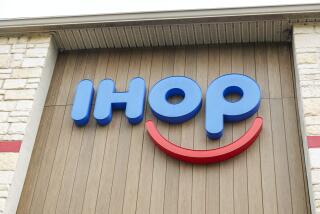IHOP May Restructure Despite Gains
IHOP Corp. posted second-quarter earnings Tuesday that handily beat analysts’ forecasts, but the parent of the International House of Pancakes chain also said it would consider a financial restructuring urged by its biggest stockholder.
The Glendale-based concern said profit in the three months ended June 30 climbed 23% to $10.2 million, or 49 cents per diluted share, from $8.3 million, or 41 cents, a year earlier.
IHOP was expected to earn 46 cents a share, according to analysts surveyed by First Call/Thomson Financial.
IHOP’s revenue rose 18%, to $82.8 million from $70.3 million.
There are 965 International House of Pancakes restaurants worldwide--about 19% of them in California--and most are operated by franchisees. IHOP’s revenue reflects franchising fees, licensing rights and equipment payments those franchisees pay the company.
Its systemwide sales--which top $1 billion annually--reflect the sales of all the restaurants. But its comparable-store sales--that is, sales of restaurants open at least a year, and the key gauge of a chain’s performance exclusive of expansion--slipped 0.2% in the second quarter compared with a year earlier.
That partly reflects the lackluster U.S. economy. But Alan Unger, IHOP’s chief financial officer, acknowledged it also reflects IHOP’s continued opening of restaurants, which in some regions is cannibalizing sales of its existing outlets. IHOP and its franchisees expect to open up to 85 restaurants this year, about the same number as in 2000.
“Our earnings growth comes principally from opening new restaurants and much less so from comparable-store sales increases,” Unger said. Although that can “sometimes cost us a few points on our comp sales,” it also gives IHOP certain economies of scale--such as spreading advertising costs over more restaurants in a given region--that help boost profit, he added.
IHOP also employs an unconventional franchising model. Rather than selling its name, equipment and supplies to a franchisee that develops a restaurant with its own cash, IHOP picks a site, builds a restaurant, gets it operating and then sells the entire package to a franchisee.
That model often also involves lending cash to the franchisees, which are assets on IHOP’s balance sheet known as receivables.
And it’s IHOP’s $287 million in long-term receivables that has attracted the attention of its largest investor, Southeastern Asset Management Inc. The money manager, based in Memphis, Tenn., owns 17.4% of IHOP’s common stock outstanding.
Southeastern announced in May that it wanted IHOP to consider selling or refinancing the receivables with “cheaper third-party debt capital,” in order to pay that sum to Southeastern and IHOP’s other stockholders in the form of dividends and/or stock repurchases.
On Tuesday, IHOP said it plans to hire an investment bank to help evaluate the proposal. “We feel they deserve a response,” Unger said of Southeastern. Charles Reaves, Southeastern’s general counsel, declined to com ment.
Southeastern’s push is one reason why IHOP’s stock has surged 73% over the last 12 months after tumbling during late-1999 and early 2000. The stock rose another 47 cents, to $28.30 a share, Tuesday on the New York Stock Exchange.
And the biggest beneficiary has been Southeastern, which paid $61.8 million--or an average $17.68 a share--for its IHOP stock, according to its government filings. That stock is worth $98.9 million, giving the firm a paper gain of $37.1 million, or 60%.
Despite its sluggish same-store sales growth, IHOP is performing fairly well in light of the weak economy, said Michael Smith, an analyst with the investment firm Fahnestock & Co.
“Restaurant companies are not immune to the economic cycles, such as when you have people being laid off,” said Smith, who has a “buy” recommendation on the stock.
IHOP opened its first restaurant in Toluca Lake in 1958. And under longtime Chief Executive Richard Herzer, it has kept growing with its decidedly unglamorous menu of flapjacks, sandwiches and salads while several trendy “concept” restaurant chains have flopped in recent years.
(BEGIN TEXT OF INFOBOX / INFOGRAPHIC)
Order Up
Shares of IHOP Corp., parent of International House of Pancakes, have surged 30% this year, even as most major stock indexes have fallen.
*
IHOP shares on the New York Stock Exchange, monthly closes
Tuesday: $28.30, up 47 cents
Source: Bloomberg News
More to Read
Inside the business of entertainment
The Wide Shot brings you news, analysis and insights on everything from streaming wars to production — and what it all means for the future.
You may occasionally receive promotional content from the Los Angeles Times.









